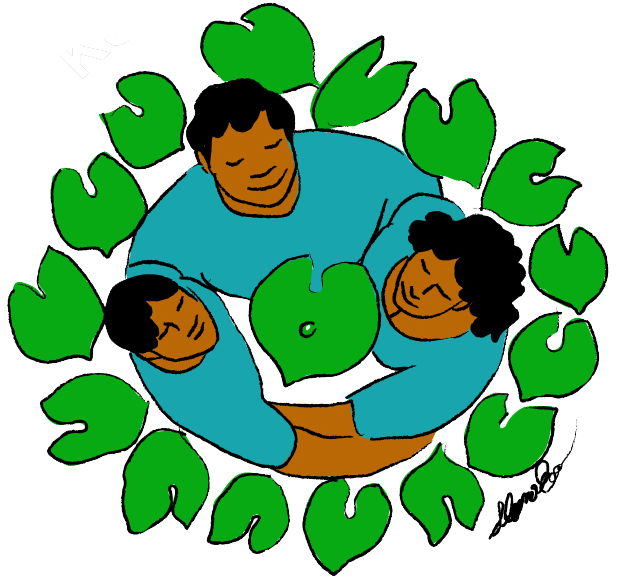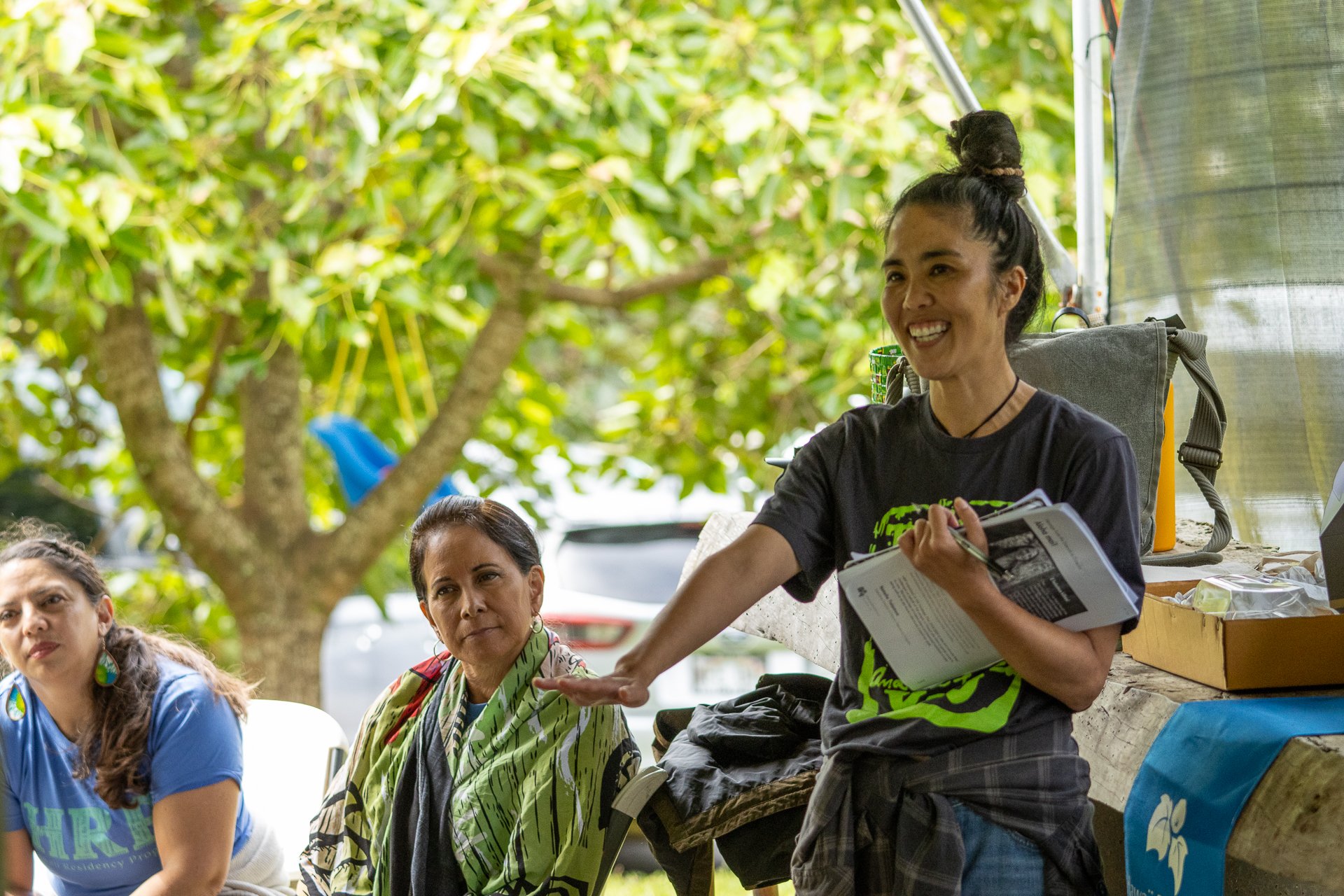ʻĀina Warrior: Megan Inada
ʻĀina Warrior Megan Inada. Photo courtesy of Kaʻōhua Lucas.
Everyone has a gift. At KKV, we strive to hone in on those gifts and help individuals use them to uplift their peers, their community, and themselves. For KKV Research Coordinator and Hui Hoaka Co-coordinator Megan Inada, the journey to acknowledging and nurturing her skills was not always easy. Her biggest gift was something she never even saw as a strength growing up. We are featuring Megan and her gift as this month’s ʻĀina Warrior.
Megan was born and raised in the Bay Area of California, and although she really enjoyed the life her family had built there, she didn’t always feel completely at home. “I felt secure in my own home, but I always had a gnawing feeling that I didn’t belong [in that community],” she explained. After grappling with this feeling for years, she took a leap of faith and moved to Hawaiʻi to pursue her master’s degree in public health. She came to Oʻahu with her grandma, and they both fell in love with the community they were now a part of. “It was nice to see recognition of my own culture,” said Megan. “In California, we rarely saw people that looked like us. Hawaiʻi just felt like the right fit.”
Although Megan found a place that now felt like home, she was still in search of work she was truly passionate about. During her first years in Hawaiʻi, she worked at the University of Hawaiʻi John A. Burns School of Medicine, where she met Dr. Seiji Yamada, one of her most influential mentors. During her time with him, she expressed her interest in health equity and desire to give back to communities. At the time, Dr. Yamada had many ties to KKV, so he told her it could be exactly what she was looking for. “At KKV, I really found a home where I could be a part of something bigger. They focused on things I really care about, like health equity and cultural safety. Everyone is working toward the same goal.”
Upon joining KKV, Megan started out as the Tobacco Cessation Coordinator, which is a part of the Behavioral Health Department. While in this position, she was most grateful to work with so many super aunties and uncles who showed her the ropes. “I’m so lucky this position allowed me to work with all departments. My favorite part was definitely working with the community.” Although Megan was learning and growing as the Tobacco Cessation Coordinator at KKV, she felt there was more that she wanted to do. After 7 years in that position, Megan decided to continue her education and go back to school to get her doctorate in public health translational research. During her studies, she focused on how racism affects indigenous communities’ access to healthcare, which stemmed from what she experienced at KKV. “The work that KKV is doing is the solution.”
In 2018, she rejoined the KKV ‘ohana as the Research Coordinator. Research and data analysis is a crucial part of how KKV looks to serve the community in the best way possible. But when the COVID pandemic hit, there was a shift in both the needs of the community and the strategies on how to serve the community efficiently but also respectfully. That’s when the Hui Hoaka Program came into being, co-led by Megan and Lalo Ishiki-Kalāhele.
In early COVID, Hui Hoaka was KKV’s emergency response program for the community. “There were certain models for care during this time, and we knew our community wasn’t going to fit into those molds.” This misalignment can be due to historical trauma, mistrust, and fear of medical settings among many of the ethnicities KKV serves. KKV is a safety net, catching people who fall through the cracks of traditional healthcare. Hui Hoaka was implemented as an even finer net, catching those who didn’t fit into other KKV departments. The program assisted patients with many of the social determinants to health, including housing, job support, legal services, and food security. Megan’s background as the Research Coordinator took this model of care to an even higher level. “It made a lot of sense to me, why [Hui Hoaka] fit so well with research,” said Megan. “We’re like a bridge between the community and healthcare, making sure people have everything they needed.”
Although we’re now stepping out of the pandemic, Hui Hoaka is still a vital part of how KKV evaluates and distributes care. “Now it’s just life. It’s just a standard of care. The community is still facing issues from before the pandemic, and now we have the tools to help.” Hui Hoaka is accountable to the community first and listens deeply to its needs. It uses research as a tool for justice and advocacy for health equity. “KKV uses research to tell our own story, which isn’t normally like how other organizations view it,” said Megan. Her passion for this work is deeply rooted in listening and learning from the community and in her drive to help others.
Megan didn’t always know that this is what she was passionate about, but now she can’t picture herself doing anything else. “I’m so amazed. How did I get gifted this position?” she said.
Research and evaluation also allowed her to reevaluate how she viewed herself and what her true strengths are. “I’ve always been a listener, not a talker. It’s nice to see something I saw as a weakness is now a gift.” Her gift as a listener allows her to hear and see things most people may miss, furthering KKV’s ability to serve the community. “I was once embarrassed to say I was a researcher. But now it’s cool to say I am. I feel so proud about it.”
Looking to the future of Hui Hoaka, Megan says she’s excited. “I feel like we’re on the edge of so many things,” she said. “Like we’re about to take a huge jump forward.” Currently, the Hui Hoaka team is working on building structure within the program and redesigning services for a post-pandemic era. With Megan’s passion, guidance, and wisdom at the helm of Hui Hoaka, the program is bound to excel in all aspects. Through Hui Hoaka, Megan hopes to help others realize their true gifts and talents, just as she did at KKV.





